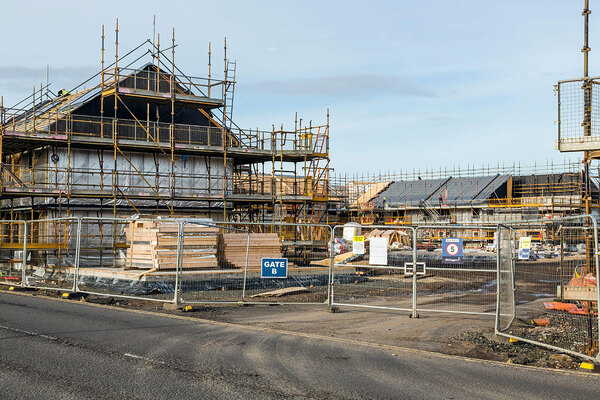The Week in Housing: long-awaited guidance on second staircases estimates cost to run into billions
The Week in Housing is our weekly newsletter, rounding up the most important headlines for housing professionals. Sign up below to get it direct to your inbox every Friday
Good afternoon.
The government finally published its guidance on second staircases this week for residential buildings that are 18 metres or taller.
The Department for Levelling Up, Housing and Communities (DLUHC) revealed the changes to Approved Document B – the government’s building guidance covering fire safety – to make clear that a second staircase is required in tall blocks of flats.
It also confirmed the end date of the transition period for the rules as 30 September 2026 and revealed that evacuation lifts will not be a requirement.
The guidance specified that interlocked stairs should be considered as a single escape route and “do not constitute an alternative means of escape”. There will be separate provisions for horizontal escape and vertical escape.
An impact assessment published alongside the technical detail estimated that compliance with the government’s preferred policy option would cost £2.7bn over the next 10 years.
The bulk of this is capital costs to build residential towers with two staircases. At the same time, £170m has been attributed to lost internal space and £82m for transitionary arrangements, such as redesigns and delays.
Purchasing land to expand the footprint of buildings would add £7m over 10 years. While the ‘monetised benefit’ of avoiding deaths and injuries in major and catastrophic incidents was estimated at just £9m over a decade.
Sneaked out at the bottom of another release, the government also confirmed that the existing social housing rent settlement will be rolled over by a further year until April 2026.
This means annual rent increases will continue to be capped at Consumer Price Index of inflation plus 1% for 2025-26.
DLUHC said the decision would provide “greater certainty for social housing tenants and landlords” in light of the new consumer regulation regime, which came into force this month.
This new regime came with the warning that “there will be consequences” for social landlords which fail new regulatory standards.
Social housing minister Baroness Scott hailed the new consumer standards as “a significant milestone” as the English regulator vowed to hold landlords to account.
MPs have urged the government to provide more clarity on its much-maligned plan to favour UK nationals when allocating social housing.
Clive Betts, chair of the Levelling Up, Housing and Communities Committee, said there were “understandable concerns” that a proposed introduction of new qualification tests for housing risked pushing people into homelessness.
He asked the government to provide an assessment of the number of households that would be affected by the planned “UK connection test”. The policy proposes six new tests to determine whether people qualify for social housing.
Mr Betts also questioned whether the government had considered which specific local authorities may be “acutely impacted” and if it had conducted an equality impact assessment for the policy.
It was a busy week for merger activity as the largest association in Wales completed its tie-up to form a new 23,000-home group.
This was followed by the coming together of Bolton at Home and Arcon Housing, which revealed plans for a new rebranded organisation from April next year.
Plus, English Rural Housing Association finalised its merger with a small East Anglian landlord.
An interesting decision came from the East London Tribunal Hearing Centre after an employment tribunal judge ruled that staff at a London association had exercised “unconscious bias” in their handling of an internal recruitment process.
L&Q was taken to a tribunal by two claimants who alleged there were breaches of the Equality Act 2010 in the way they were overlooked for a promotion.
Given the economic uncertainty in the sector over the past 18 months at least, there will have been little surprise the latest government figures found that the number of new build starts in England fell 16% in 2023 compared with the previous year.
The drop-off in delivery has been dramatic of late, with numerous housing associations and sector bodies sounding the alarm.
This was also something that Fiona Fletcher-Smith, chair of the G15, discussed in an interview with Inside Housing, in which she outlined serious concerns about where the housing crisis is going unless the government changes its approach.
In February, housing secretary Michael Gove announced that permitted development rights (PDR) would be expanded to cover shops and offices of any size. However, a medical charity and an academic researcher have raised concerns over the plans.
Medact said it had encountered seriously poor conditions in housing created under current PDR rules and warned that the new rights could lead to a “further deterioration” in standards.
Research by the Social Workers Union revealed that nearly two-thirds of children’s social workers reported seeing families living in homes with “excessive” mould or damp.
The union described the figure as a “national scandal”, as the study also found that 55% of people supported by social workers are currently living in cold, damp homes.
Late last year, Origin Housing revealed it was looking for new owners for its properties in Essex so it could refocus its business on London and Hertfordshire. However, an update on Wednesday confirmed the landlord has cancelled its withdrawal from the county after it was unable to sell any of the homes.
Following a spate of similar decisions this year, Newham Council became the latest to scrap plans for an affordable housing scheme after significant construction cost hikes and delays in securing the necessary statutory consent.
Finally this week, Inside Housing took a deep dive into the archives of our Biggest Builders data to find out which housing associations built the most social rent homes in the past decade.
Have a great weekend.
Stephen Delahunty, news editor, Inside Housing
Say hello: stephen.delahunty@insidehousing.co.uk
Editor’s picks: five stories you may have missed
Peabody appoints Southern Housing director as group treasurer
Major Scottish landlord pulls out of property management
Hundreds of homes in 6,000-home eco-village approved
‘Alarming’ amount of exempt accommodation in Birmingham falls below local council standards
Sign up for our Week in Housing newsletter
Already have an account? Click here to manage your newsletters












